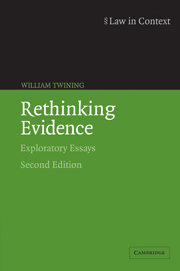Book contents
- Frontmatter
- Contents
- Preface
- Acknowledgements
- List of abbreviations
- Table of cases
- 1 Introduction: the story of a project
- 2 Taking facts seriously
- 3 The Rationalist Tradition of evidence scholarship
- 4 Some scepticism about some scepticisms
- 5 Identification and misidentification in legal processes: redefining the problem
- 6 What is the law of evidence?
- 7 Rethinking Evidence
- 8 Legal reasoning and argumentation
- 9 Stories and argument
- 10 Lawyers' stories
- 11 Narrative and generalizations in argumentation about questions of fact
- 12 Reconstructing the truth about Edith Thompson the Shakespearean and the jurist
- 13 The Ratio Decidendi of the Parable of the Prodigal Son
- 14 Taking facts seriously – again
- 15 Evidence as a multi-disciplinary subject
- Bibliography
- Index
3 - The Rationalist Tradition of evidence scholarship
Published online by Cambridge University Press: 15 December 2009
- Frontmatter
- Contents
- Preface
- Acknowledgements
- List of abbreviations
- Table of cases
- 1 Introduction: the story of a project
- 2 Taking facts seriously
- 3 The Rationalist Tradition of evidence scholarship
- 4 Some scepticism about some scepticisms
- 5 Identification and misidentification in legal processes: redefining the problem
- 6 What is the law of evidence?
- 7 Rethinking Evidence
- 8 Legal reasoning and argumentation
- 9 Stories and argument
- 10 Lawyers' stories
- 11 Narrative and generalizations in argumentation about questions of fact
- 12 Reconstructing the truth about Edith Thompson the Shakespearean and the jurist
- 13 The Ratio Decidendi of the Parable of the Prodigal Son
- 14 Taking facts seriously – again
- 15 Evidence as a multi-disciplinary subject
- Bibliography
- Index
Summary
What was formerly ‘tried’ by the method of force or the mechanical following of form is now tried by the method of reason.
ThayerAt the start of Shakespeare's Richard II Bolingbroke and Mowbray, Duke of Norfolk, are called before the King ‘to appeal each other of high treason’. Each of the disputants is anxious to defend his honour and to prove the other a traitor in the lists. Before they come before him, Richard asks Gaunt if this dispute is based on ancient malice or ‘worthily, as a good subject should, on some known ground of treachery in him’. Gaunt replies that, ‘as near as I could sift him on the argument’, there is no inveterate malice, but apparent danger to the King. Richard responds:
Then call them to our presence; face to face
And frowning brow to brow, ourselves will hear
The accuser and the accused, freely speak.
Only after they have had their say and Richard and others have failed to persuade them to make up, does he reluctantly agree to let
… your swords and lances arbitrate
The swelling difference of your settled hate.
They reassemble at Coventry ready for battle, but the King intervenes at the last moment to stop the fight and to banish both disputants, a classic example of a disastrous attempt at peaceful dispute-settlement.
We need not here concern ourselves with the detailed accuracy of Shakespeare's account of the proceedings, nor with whether this mode of dispute-settlement can appropriately be said to have involved a ‘trial’, political or otherwise.
- Type
- Chapter
- Information
- Rethinking EvidenceExploratory Essays, pp. 35 - 98Publisher: Cambridge University PressPrint publication year: 2006
- 3
- Cited by



